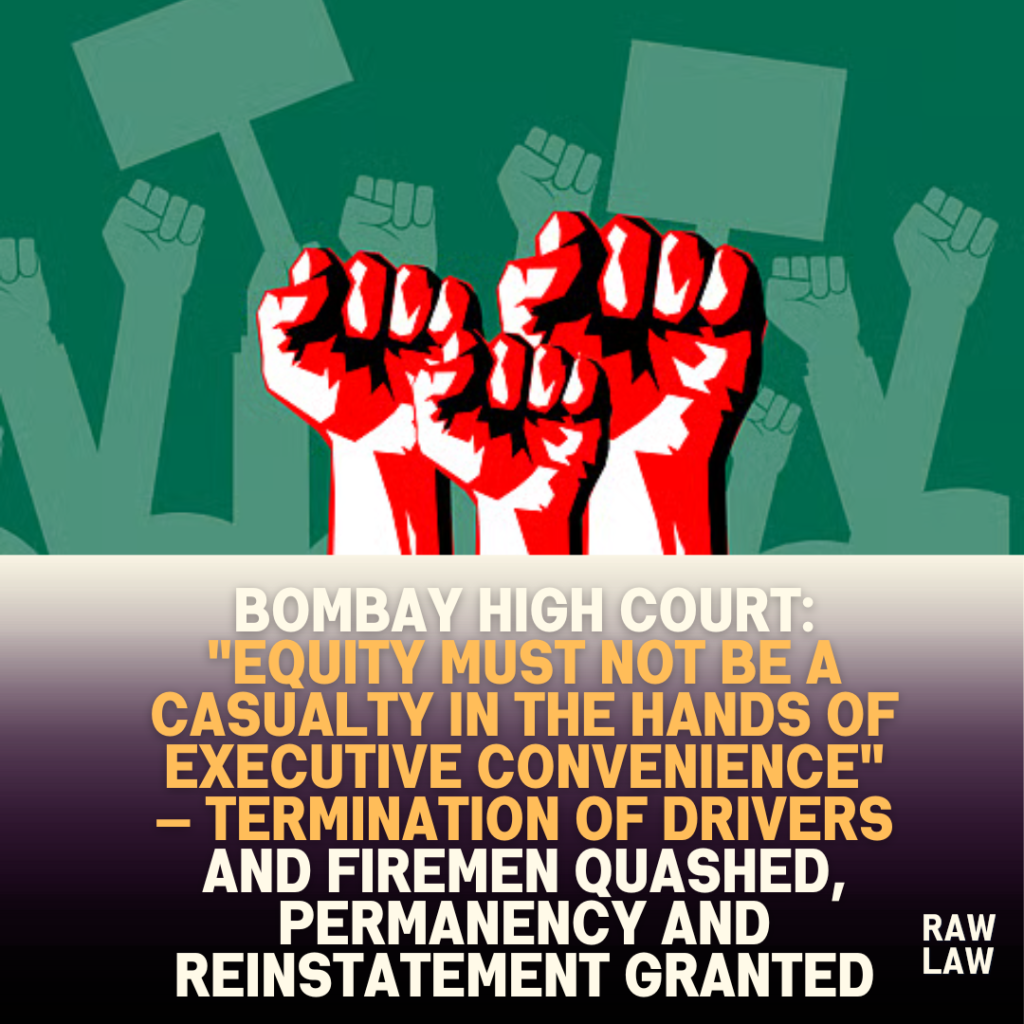Court’s Decision
The Bombay High Court quashed the Industrial Court’s dismissal of ULP complaints and set aside the Malegaon Municipal Corporation’s termination orders against four employees (two drivers and two firemen). The Court directed their reinstatement with continuity of service, back wages from the date of termination, and benefits of permanency. It held that keeping employees on temporary contracts for nine years in essential services amounted to “exploitation” and violated Articles 14, 16, and 21 of the Constitution.
Facts
- Petitioners were appointed between February–April 2017 as Drivers and Firemen on daily wages by Malegaon Municipal Corporation.
- Their appointments were repeatedly extended every six months, with artificial breaks, despite continuous service for nine years.
- They filed ULP Complaints (2019) seeking permanency. Interim relief was granted, and their services continued.
- On 06.05.2025, the Industrial Court dismissed their ULP complaints citing financial constraints (administrative expenditure exceeding 35%).
- On 02.07.2025, while writ petitions were pending, the Corporation terminated their services.
Issues
- Whether continuous employment of petitioners as Drivers/Firemen for nine years entitled them to permanency.
- Whether the Corporation’s reliance on a Government Resolution restricting establishment expenditure to 35% of revenue could justify denial of permanency.
- Whether termination during pendency of writ petitions amounted to arbitrary and unfair labour practice.
Petitioners’ Arguments
- They worked continuously for nine years in essential service posts, performing identical duties as permanent employees.
- Artificial breaks were only on paper; in reality, their services were uninterrupted.
- Termination during pendency of petitions was arbitrary and violative of settled law.
- Financial constraints could not justify perpetual exploitation.
- Having completed over 240 days for consecutive years, they were entitled to permanency and statutory benefits.
Respondent’s Arguments
- Corporation cited the Government Resolution dated 14.01.2016, which capped establishment expenditure at 35% of revenue.
- Since expenditure had crossed 49.2%, Corporation was “powerless” to make fresh permanent appointments.
- Petitioners were continued only due to interim orders; hence, permanency could not be claimed.
Analysis of the Law
- The Court emphasised Article 14 fairness in state action and that “equity must not be a casualty in the hands of executive convenience.”
- It held that petitioners’ appointments were in fact against newly created sanctioned posts (1247 posts sanctioned in 2016).
- Financial constraints could not be a reason to exploit workers indefinitely.
- Termination during pendency of petitions was termed arbitrary and high-handed.
Precedent Analysis
- Harbhan Singh v. Bhakra Beas Management Board (P&H HC, 2025): Workers are “not faceless names in a file but human beings who served with dignity.”
- Conservator of Forests v. Savala Dhondiba Pise (Bom HC, 2010): Continuous employment without permanency is an unfair labour practice.
- Secretary, State of Karnataka v. Umadevi (SC) distinguished — irregular but not illegal appointments can be regularised.
- Dharam Singh v. State of U.P. (SC, 2025): Financial constraints cannot justify long-term ad hocism in essential posts.
- Jaggo v. Union of India (SC, 2024) and Shripal v. Nagar Nigam, Ghaziabad (SC, 2025): Umadevi cannot be used to justify exploitation through perpetual temporary employment.
Court’s Reasoning
- Petitioners completed 240 days continuously for nine years; denial of permanency amounted to unfair labour practice.
- Artificial breaks could not defeat substantive rights.
- Corporation selectively regularised certain categories (Safai Kamgar) but denied benefit to essential services like Firemen/Drivers — this was discriminatory.
- “If Corporation’s argument is accepted, it would amount to enslavement of petitioners as bonded labourers, and Court cannot be a mute spectator.”
- Financial constraints do not override constitutional fairness.
Conclusion
- Industrial Court’s orders dated 06.05.2025 quashed.
- Corporation’s termination orders dated 02.07.2025 set aside.
- Petitioners directed to be reinstated within one week, with continuity of service, back wages from 02.07.2025, and benefits of permanency.
Implications
- The ruling strengthens protection of contract/daily wage employees in essential services against arbitrary termination.
- Reiterates that financial constraints cannot be an excuse to perpetuate exploitation.
- Reinforces Article 14 fairness, equality in state employment, and recognition of human dignity in labour jurisprudence.
Also Read: Bombay High Court: “Large corporates must avoid frivolous litigation to frustrate MSME claims” – Arbitration Appeal by Mahindra Defence dismissed, MSME supplier’s award upheld.



